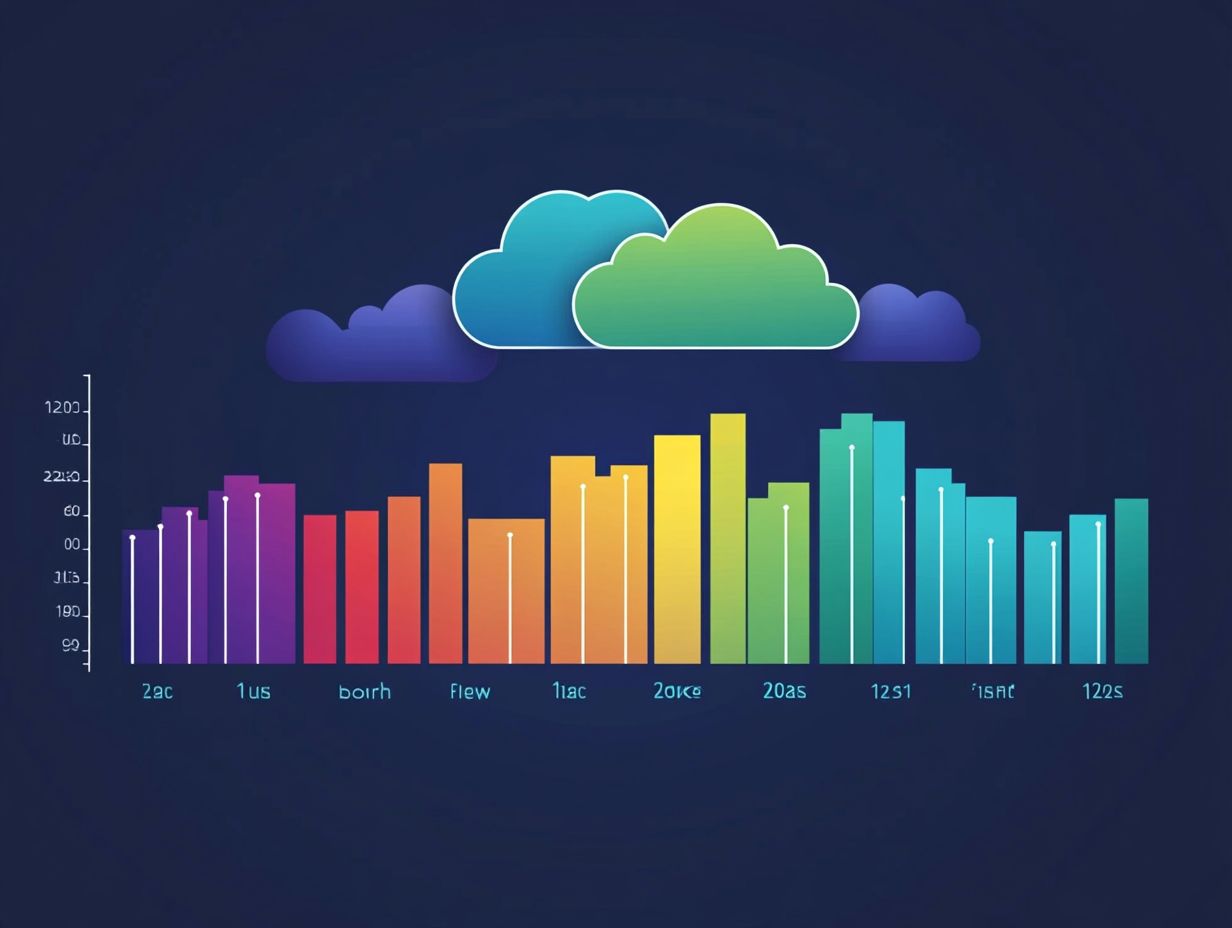Cloud Provider Ratings: An Overview of 2024
In the rapidly evolving digital landscape, selecting the right cloud provider is essential for business leaders striving to optimize operations and maximize return on investment.
Cloud provider ratings serve as a crucial framework for assessing potential partners, focusing on key factors such as performance, reliability, and security.
This article delves into the significance of these ratings, showcases the top-rated providers for 2024, and outlines essential metrics for comparison. It also explores emerging trends shaping the cloud market, ensuring you are equipped to make informed decisions moving forward.
Contents
- Key Takeaways:
- Why Ratings Matter for Businesses
- Factors to Consider in Cloud Provider Ratings
- Top Rated Cloud Providers in 2024
- How to Evaluate and Compare Cloud Providers
- Future Trends in Cloud Provider Ratings
- Frequently Asked Questions
- What are cloud provider ratings and why are they important?
- How are cloud provider ratings determined?
- Why is 2024 crucial for cloud provider ratings?
- What are some key factors to consider when looking at cloud provider ratings for 2024?
- Can I trust the accuracy of cloud provider ratings for 2024?
- What are some popular cloud providers with high ratings for 2024?
Key Takeaways:

Cloud provider ratings greatly influence business decisions and ROI.
Performance, reliability, and security are key factors to consider when evaluating cloud providers.
In 2024, the leading cloud providers will be highly rated for these qualities.
What are Cloud Provider Ratings?
Cloud provider ratings are essential evaluations that help you assess the effectiveness and reliability of various cloud services, including major players like Amazon Web Services, Microsoft Azure, and Google Cloud Platform.
For organizations looking to utilize cloud technology for their infrastructure needs, these ratings are invaluable for driving business efficiency. A favorable rating usually indicates a provider’s strengths in cloud infrastructure, services that help manage IT resources, and support across deployment models whether public, private, or hybrid.
Selecting the right cloud solution can significantly impact your operational productivity and cost-effectiveness. The true value of cloud provider ratings lies in their ability to consolidate user experiences and expert insights, enabling you to make informed decisions.
Key factors such as uptime reliability, security features, pricing models, and customer support responsiveness all play a crucial role in the overall assessment. By comparing ratings from reputable sources, you can better understand which provider meets your specific needs.
This ensures you choose a cloud service that aligns with your strategic goals while optimizing resource management effectively.
Why Ratings Matter for Businesses
Understanding the significance of cloud ratings for your business is crucial in today s digital landscape, where cloud technology underpins operational efficiency and strategic growth.
These ratings offer valuable insights into service providers’ performance, influencing your decisions regarding cloud deployment, associated costs, and overall return on investment (ROI).
By leveraging these ratings, you can align your cloud strategies with your specific requirements, ensuring you choose providers that fit your needs and bolster your competitive edge.
Impact on Decision Making and ROI
The impact of cloud provider ratings on your decision-making and ROI is substantial; they guide you as you navigate the intricate landscape of cloud services.
By considering these ratings, you can optimize cloud pricing models and select the most suitable solutions, maximizing your return on investment.
This strategic approach allows you to align your cloud technology choices with your operational needs and objectives. Evaluating these ratings means assessing performance metrics, customer satisfaction levels, and service reliability all of which are crucial for shaping your investment strategies.
When you leverage insights from provider ratings, you can better manage expenditures while ensuring that your chosen services meet both current requirements and future demands.
A thorough understanding of these ratings enables you to create a robust framework for calculating ROI, providing clarity on the financial benefits tied to your cloud migrations. Ultimately, organizations that strategically integrate cloud provider ratings into their decision-making processes are likely to enjoy enhanced cost efficiency and overall success.
Factors to Consider in Cloud Provider Ratings

When evaluating cloud provider ratings, several critical factors demand your attention to ensure that the chosen provider meets your organizational needs effectively.
Key elements include performance, reliability, cloud security, and regulatory approvals. These factors play a pivotal role in shaping a provider’s reputation and effectiveness in delivering cloud services.
Understanding these factors enables you to make informed decisions, optimizing your cloud setup and maximizing service utilization.
Performance, Reliability, and Security
Performance, reliability, and security define the quality of any cloud service provider, directly impacting their ratings. Your choice of provider should hinge on their ability to maintain high uptime, deliver robust infrastructure, and safeguard data security especially if your business relies on cloud solutions for critical applications.
These factors boost operational efficiency and cultivate customer trust and satisfaction.
In today s increasingly digital landscape, the importance of these elements cannot be overstated. High performance ensures that your applications run smoothly, minimizing latency and enhancing user experience. Reliability guarantees that your services are consistently available, reducing the risk of downtime, which can disrupt business operations. Meanwhile, security addresses the ever-looming threat of cyberattacks, protecting sensitive data and ensuring compliance with regulations.
When these elements come together, they streamline your workflow and foster stronger partnerships, giving you the confidence to make informed cloud service choices.
Top Rated Cloud Providers in 2024
Get ready to discover the standout cloud providers of 2024 that are changing the game! Several providers have distinguished themselves with exceptional service offerings, aligning with the top trends in cloud migration for 2024, earning their status as top-rated players in the cloud services landscape.
Companies like Amazon Web Services, Microsoft Azure, and Google Cloud Platform remain at the forefront, constantly innovating and expanding their cloud solutions. They provide a diverse array of options that cater to various business needs, including:
- Infrastructure-as-a-Service (IaaS): This provides virtualized computing resources over the internet.
- Software-as-a-Service (SaaS): This allows users to access software applications online without installation.
These providers have established high standards in performance, reliability, and security, making them the preferred choices for businesses transitioning to the cloud.
Overview of the Leading Providers
The leading cloud providers, including Amazon Web Services, Microsoft Azure, and Google Cloud Platform, have positioned themselves as titans in the cloud services arena, delivering a broad spectrum of solutions to meet diverse business needs.
Each provider has unique strengths to meet different needs. Amazon Web Services shines with its extensive toolkit for developers and enterprises, allowing for swift scalability and innovation through its rich ecosystem of offerings.
Microsoft Azure stands out in hybrid cloud solutions, appealing to businesses that seek seamless integration with existing Microsoft products.
Google Cloud Platform is renowned for robust data analytics capabilities and machine learning tools, catering to organizations heavily invested in big data and AI applications.
Collectively, these providers drive technological progress and enable cost-effective strategies tailored to specific industry requirements, ensuring organizations excel in an increasingly competitive landscape.
How to Evaluate and Compare Cloud Providers

Evaluating and comparing cloud providers is essential for businesses aiming to implement cloud technology effectively. Ensuring your choices align with both operational goals and budget constraints is crucial.
This assessment requires leveraging various cloud tools and analytics to scrutinize providers against key performance indicators, pricing structures, and deployment models.
By adopting a systematic approach to this evaluation, you empower yourself to confidently choose the right cloud solutions tailored to your business.
Key Metrics to Look For
When evaluating cloud providers, several key metrics deserve your attention to ensure you gain a full understanding of their capabilities and how well they align with your business needs.
Important factors to consider include:
- Performance indicators
- Cloud costs
- Security measures
- Service-level agreements
These elements give you crucial insights into the provider’s reliability and overall value proposition.
Consider the scalability of the solutions offered, as this can significantly influence your future growth. Monitoring uptime and response times is essential for assessing the responsiveness and availability of services.
The quality of customer support can be a game changer. Effective communication and assistance during critical moments truly make a difference. Compliance with industry regulations is vital, as it ensures the cloud environment meets necessary standards and mitigates security risks.
Together, these metrics create a solid framework for selecting the ideal cloud partner, helping you align technology and business strategies seamlessly.
Future Trends in Cloud Provider Ratings
As cloud technology evolves rapidly, expect future trends in cloud provider ratings to emerge, showcasing the dynamic landscape of the cloud market and the growing significance of cloud advantages for businesses.
Innovations in artificial intelligence, machine learning, and robust cloud security measures will shape how these ratings are structured and understood.
This evolution will provide invaluable insights into your cloud services and operational efficiencies, enabling your business to make more informed decisions.
Anticipated Changes and Developments
Anticipated changes in cloud provider ratings will likely focus on integrating more sophisticated metrics that reflect the latest advancements in cloud technology and the top hybrid cloud trends to watch in 2024 that address the evolving needs of businesses.
As compliance certifications gain prominence in the evaluation process, businesses are increasingly seeking cloud solutions that deliver exceptional performance while adhering to regulatory standards, ensuring data confidentiality and integrity.
The emergence of innovative technologies like artificial intelligence and machine learning will profoundly impact these ratings, making them dynamic and responsive to market trends.
As organizations place greater emphasis on real-time analytics, providers that harness these cutting-edge solutions will likely see their evaluations soar.
The complexities of data governance and privacy laws across various regions will compel firms to prefer providers who demonstrate robust compliance mechanisms.
This comprehensive perspective will elevate the standards expected from cloud services and ignite competition, pushing providers to continually refine their offerings to stay relevant in an ever-evolving digital landscape.
Frequently Asked Questions

What are cloud provider ratings and why are they important?
Cloud provider ratings are evaluations of various cloud service providers based on factors such as performance, reliability, security, and customer satisfaction. These ratings help businesses and individuals make informed decisions when choosing a cloud provider that best fits their needs.
How are cloud provider ratings determined?
Cloud provider ratings are typically determined by third-party organizations or research firms through various methods, including customer surveys, technical evaluations, and expert analysis. These ratings often consider factors such as uptime (the time the service is operational and accessible), response time, security protocols, and customer support.
Why is 2024 crucial for cloud provider ratings?
2024 is significant for cloud provider ratings as it marks the projected end of the current decade, providing a comprehensive overview of the top cloud providers in the market. By looking at ratings specifically for 2024, users can gain insights into IaaS trends to watch in 2024 and better understand the emerging trends and leading players in the industry.
Understanding cloud provider ratings is essential for making informed decisions about your cloud services. By evaluating the key metrics and keeping an eye on future trends, you can choose a cloud partner that aligns with your business goals.
What are some key factors to consider when looking at cloud provider ratings for 2024?
When evaluating cloud provider ratings for 2024, key factors include performance, reliability, and keeping your information safe. For a detailed overview, check out the top 5 cloud storage services for 2024.
Always consider your business’s unique needs when comparing these ratings!
Can I trust the accuracy of cloud provider ratings for 2024?
Cloud provider ratings come from thorough research and credible sources. However, always do your own research and look at multiple sources to find what’s best for you.
What are some popular cloud providers with high ratings for 2024?
Top cloud providers for 2024 include Amazon Web Services, Microsoft Azure, Google Cloud Platform, and IBM Cloud! These companies are highly rated for their performance and customer satisfaction.





